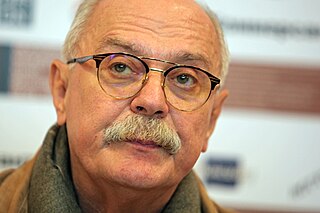
Nikita Sergeyevich Mikhalkov is a Soviet and Russian filmmaker, actor, and head of the Russian Cinematographers' Union. Mikhalkov is a three-time laureate of the State Prize of the Russian Federation and is a Full Cavalier of the Order "For Merit to the Fatherland".
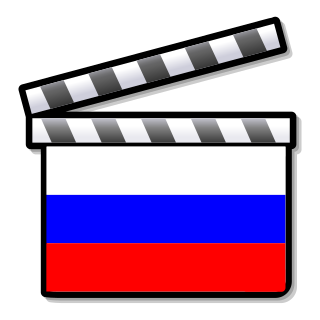
The cinema of Russia began in the Russian Empire, widely developed in the Soviet Union and in the years following its dissolution. The Russian film industry would remain internationally recognized. In the 21st century, Russian cinema has become known internationally with films such as Hardcore Henry (2015), Leviathan (2014), Night Watch (2004) and Brother (1997). The Moscow International Film Festival began in Moscow in 1935. The Nika Award is the main annual national film award in Russia.
Peter Flannery is an English playwright and screenwriter. He was born in Jarrow, Tyne and Wear and educated at the University of Manchester. He is best known for his work while a resident playwright at the Royal Shakespeare Company in the late 1970s and early 1980s. Notable plays during his tenure include: Savage Amusement (1978), Awful Knawful (1978), and Our Friends in the North (1982). Other theatre work has included Singer (1989).
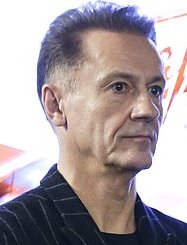
Oleg Evgenyevich Menshikov, PAR is a Russian actor, theatre director and occasional singer. He is the current artistic director of the Yermolova Theatre in Moscow.

Rustam Mammad Ibrahim oghlu Ibrahimbeyov was a Soviet and Azerbaijani screenwriter, playwright and producer, well known beyond his home Azerbaijan and the former Soviet Union. He was the chair of the Cinematographers' Union of Azerbaijan and director of the Ibrus Theatre.
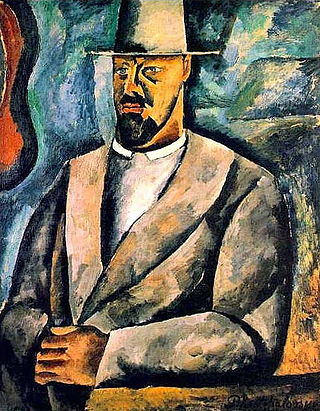
Pyotr Petrovich Konchalovsky was a Russian and Soviet painter, a member of the Knave of Diamonds group.
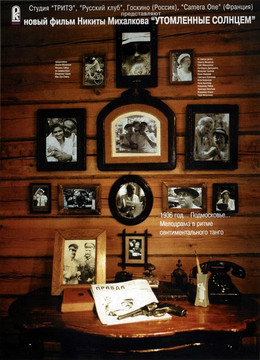
Burnt by the Sun is a 1994 Russian drama film directed, written, produced and starring by Nikita Mikhalkov and co-written by Azerbaijani screenwriter Rustam Ibragimbekov. The film depicts the story of a senior Red Army officer, played by Mikhalkov, and his family during the Great Purge of the late 1930s in the Stalinist Soviet Union. While on vacation with his wife, young daughter, and assorted friends and family, things change dramatically for Colonel Kotov when his wife's old lover, Dmitri, shows up after being away for many years. The film also stars Oleg Menshikov, Ingeborga Dapkūnaitė and Mikhalkov's daughter Nadezhda Mikhalkova.

The Golden Eagle Award is an award given by the National Academy of Motion Pictures Arts and Sciences of Russia to recognize excellence of professionals in the film industry, directors, actors, and writers. Modelled after the American Golden Globe Awards, the formal ceremony at which the awards are presented is one of the most prominent award ceremonies in Russia, alongside the Nika Award.
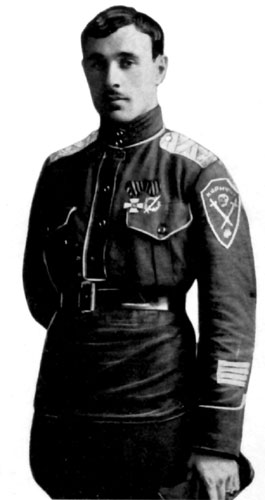
Nikolai Vladimirovich Skoblin was a general in the White Russian army, a senior operative in the émigré expatriate Russian All-Military Union (ROVS) and a recruited Soviet spy, who acted as an intermediary between the NKVD and the Gestapo in the Tukhachevsky affair and was instrumental in the abduction of the ROVS chairman Gen Yevgeny Miller in Paris in 1937. He was married to the Russian singer Nadezhda Plevitskaya. A number of important details about his cooperation with the USSR′s intelligence agencies as well as exact circumstances of his death have remained controversial and contested.
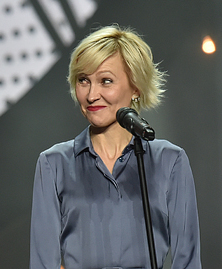
Ingeborga Dapkūnaitė is а Lithuanian theatre and cinema actress, who appears mostly in Russian films. She is a winner of the Nika Award in 1994 for Best Actress.

The Barber of Siberia is a 1998 Russian drama film that re-united the Academy Award-winning team of director, writer, producer and actor Nikita Mikhalkov, screenwriter Rustam Ibragimbekov and producer Michel Seydoux. It was screened out of competition at the 1999 Cannes Film Festival. The film was selected as the Russian entry for the Best Foreign Language Film at the 71st Academy Awards, but was disqualified for not getting a print lately to Los Angeles as a nominee.

Urga is a 1991 Russian drama film by Russian director, screenwriter and producer Nikita Mikhalkov. It was released in North America as Close to Eden. It depicts the friendship between a Russian truck driver and a Mongolian shepherd in Inner Mongolia. The film was an international co-production between companies based in Russia and France. It received generally positive reviews from critics.
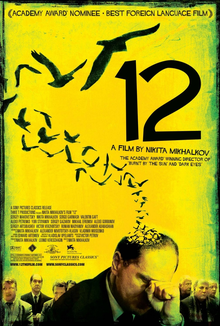
12 is a 2007 legal drama film by Russian director, screenwriter, producer and actor Nikita Mikhalkov. The film is a Russian-language remake of Sidney Lumet's 1957 film 12 Angry Men, which in turn was based on Reginald Rose's 1955 stage play, Twelve Angry Men, itself based on Rose's 1954 teleplay of the latter's same name.

Vladimir Valentinovich Menshov was a Soviet and Russian actor and film director. He was noted for depicting the Russian everyman and working class life in his films. Although Menshov mostly worked as an actor, he is better known for the films he directed, especially for the 1979 melodrama Moscow Does Not Believe in Tears, which won the Academy Award for Best Foreign Language Film. Actress Vera Alentova, who starred in the film, is the mother of Vladimir Menshov's daughter Yuliya Menshova.

Burnt by the Sun 2: Exodus is a 2010 Russian drama film directed, written, produced by and starring Nikita Mikhalkov, released on 22 April 2010. It is the sequel to Mikhalkov's 1994 film Burnt by the Sun, set in the Eastern Front of World War II. Burnt by the Sun 2: Exodus had the largest production budget ever seen in Russian cinema, but it turned out to be Russia's biggest box office flop, and received negative reviews from critics both in Russia and abroad.

Before the Rain is a 1994 film written and directed by Milcho Manchevski, starring Katrin Cartlidge, Rade Šerbedžija, Grégoire Colin and Labina Mitevska, photographed by Manuel Teran, edited by Nicolas Guster and featuring an original score by the Macedonian band Anastasia. The sophisticated interplay of three seemingly unrelated short narratives and the emotional effect of the masterful directing were highly praised by the reviews and festivals, and appreciated by audiences in more than 50 countries.

Nadezhda Nikitichna Mikhalkova is a Russian actress.
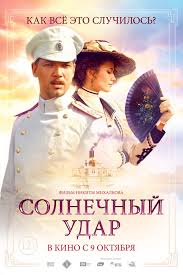
Sunstroke is a 2014 Russian drama film directed, produced and written by Nikita Mikhalkov, starring Martinsh Kalita and Viktoriya Solovyova. It is set after the collapse of the Russian Empire during the Red Terror in 1920, with flashbacks to 1907, and is loosely based on the story "Sunstroke" and the book Cursed Days by Nobel Prize-winning Russian writer Ivan Bunin. The film was selected as the Russian entry for the Best Foreign Language Film at the 88th Academy Awards, but it was not nominated.
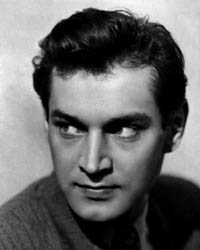
Vladlen Semyonovich Davydov was a Soviet and Russian theater and film actor. People's Artist of the RSFSR (1969). The winner of two Stalin Prizes. Member of the Communist Party of the Soviet Union since 1950. Academician of the National Academy of Motion Picture Arts.


















